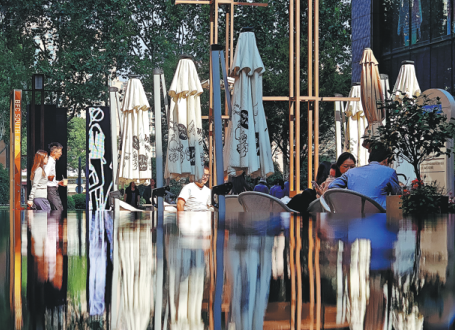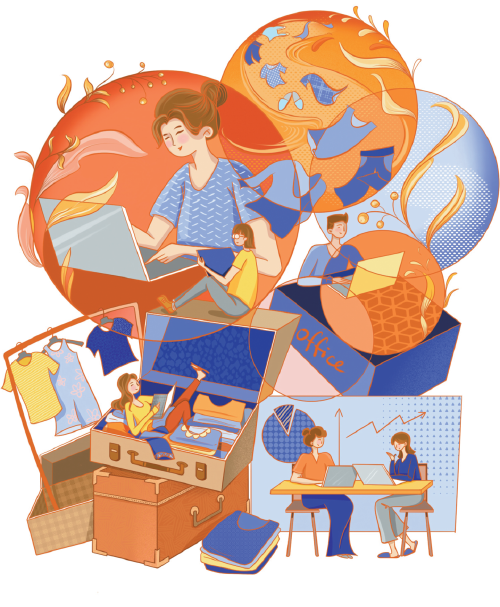Workplace dressing-down
New attitudes to their career and high-pressure lifestyles are changing workers' style codes
By ZHAO YIMENG | China Daily Global | Updated: 2024-04-05 10:45

Cartoon-patterned cotton pants with a knitted dress layered over them, red-checkered trousers paired with black leather shoes, or pajama pants matched with rain boots. These outfits are not part of a weird outfit competition but what some young people are wearing to work.
In recent months, "gross outfit at work" has been trending on social media, with photos and short videos of young people wearing ugly clothes at the office garnering millions of views.
The source of "gross outfits" can be traced to a blogger on Douyin, the Chinese version of TikTok, who shared her work experience in early September 2023 and mentioned how she had to endure working without heating during winter.
She ended up wearing flesh-colored fleece pants and fleece sneakers under her red work uniform, and was scolded by her female boss for "disgusting" dressing.
In the related comments, some people said they now go to work without even bothering to wash their faces. After getting up, they simply wipe their eyes with a towel, brush their teeth and head out.
Others mentioned that they are too lazy to carry a backpack, so they use milk tea packaging or takeaway bags to carry items they need for work.
Some claimed that after having a job, their "worn-out clothes finally found a place to show up" and joked that there is no one to care about at the workplace.

Though some commented that young workers in China "are rectifying the workplace", more believe that "gross outfits" don't mean untidiness or resistance to work, but advocacy of their relaxed attitudes, which focus on their feelings instead of traditional rules.
Du Jinghua, a 22-year-old employee in Beijing, said although the lackluster outfits in short videos tend to be a novel expression of young people, the reasons behind it should get public attention.
As a worker in the e-commerce industry, Du usually wears simple and comfortable clothes at work and cares less about the style of his outfit.
"'Gross outfit reveals a change in young people's attitudes toward the workplace, transforming from personal feelings compromised by work to vice versa," Du said.
A casual outfit may look indecent but is comfortable, reflecting the practical attitude that young employees prefer at work, Du said.
Although many people post ugly clothes at work just to follow the fashion or be different, he believes that "gross outfits" are one of the measures young workers use to challenge the current workplace environment.
"As the new generation's mentality toward work and life gradually changes, resistance to traditional rules at the office will be a trend, expressed either in an ugly outfit or in other ways in the future," Du said.
Yuan Xinyue said she or her colleagues never wear such outfits to work but the phenomenon may reveal a rebellion to proper work attire and a response to workplace and social pressures.
Apart from pursuing self-expression, the disheveled outfit of many young workers may just indicate the undeniable facts of long commutes, limited sleeping time and anxiety due to work pressure, Yuan said.

"Given the time-consuming and crowded commuting environment, we tend to choose fast and convenient clothes to save preparation time in the morning. The practical function of clothes usually gives way to fashion," the 23-year-old Beijing resident said.
On the other hand, office culture and interactions with colleagues can also affect the dressing choices of young people.
"Some may feel trapped by 'beauty shame' at the workplace, fearing that dressing too elegantly might draw undue attention from co-workers and bosses, which leads to gossip and ridicule," Yuan said.
This could trigger self-doubt of "my abilities don't match the attire "and feeling nervous and embarrassed, she said.
Additionally, some young workers may face economic pressures, burdened by a mortgage or car payments, making it difficult to afford proper attire, she added.
"The effect of the COVID-19 pandemic has profoundly influenced people's consumption habits. Some people are no longer pursuing outward refinement and extravagance, but focusing more on practicality in terms of dressing," Yuan said.
However, Yuan thought the trend of "ugly outfits" was not likely to become mainstream in the future. "Most people do not blindly follow fads. Instead, they tend to choose and adjust their fashion style according to the specific occasion and their individual needs," she said.
For instance, formal attire is often required for professions such as lawyers and broadcasters, while journalists may prioritize simplicity and convenience in their dressing to assist their work.
"Dressing appropriately allows us to demonstrate our professional demeanor," Yuan said.

Cao Qingqing, a 25-year-old college counselor in Shanghai, said "gross outfit" videos on Douyin "are a little bit exaggerated". But many people do believe they can dress as casually as they can at work, reflecting a changing mentality.
"When I just started my career, I carefully dressed up and wore beautiful makeup every day in a bid to attract the attention of my colleagues, particularly my boss, trying to remind them of the newcomer," Cao said.
"But later my workmates in the office told me that whatever they looked like, the boss would not care and their career hadn't improved because of their dress. They gradually gave up focusing on outfits and were unwilling to spend time dressing up for work as the commuting and overtime were already exhausting," Cao said.
Cao prefers casual and comfortable clothes at work, but she and her workmates never wear slippers or sloppy clothes like those in the videos.
If her career went into a steady period and included a few social activities, Cao said she may just randomly dress up and wear exquisite makeup to make herself happy.
People post videos of "gross outfits" to vent pressure but few really dress like that at the workplace, she said.
"I think there's a common struggle that not many people actually love the idea of going to work, especially among the younger generation," Cao said.
So, they just dress comfortably every day because they don't really care about gaining more job opportunities or competing in the company through this approach.
Although more people prefer wearing comfortable and clean clothes in the office, a workplace outfit usually depends on the exact profession, Cao said. She used to work in the film and television industry, where it's necessary to have flawless makeup and follow certain dress codes.
Hao Lin, a 31-year-old employee at a finance company in Beijing, has to wear formal shirts at the workplace. He usually prepares multiple shirts in his locker room at the office and gets changed before and after work. "I prefer wearing loose T-shirts and hoodies on my way to work, making the long and tiring commute easier," Hao said.
Female workers have more choices but a collar is a must for either dress or coat, he said.
"We can never try 'gross outfits' at work to defy the company's regulation, though we do dress more relaxed on casual Fridays," Hao said.
Hao usually participates in sports activities held by the company after work and needs to bring sportswear with him every day. Sometimes he has three outfits for a single day.
"I heard some female friends at other companies can wear leggings and sports tops inside a coat at work and directly go to the gym after work without getting changed," he said, adding that a free dressing environment would better help the work-life balance of young workers.
For English teacher Li Min, it's impossible to stand at the lectern and face primary school students with a "gross outfit".
"The eye-catching dress would distract student's attention and affect their learning, so we usually wear normal clothes," Li said.
The 27-year-old sometimes wears hoodies and sweatpants, pairing with sneakers, or casual vests with jeans to perform daily running exercises with students.
Once when she switched from wearing glasses to contacts to avoid fogging on the glasses in the freezing winter, her students stared at her curiously and kept asking where her glasses were.
"A little change of my appearance or hairstyle will distract their attention at school," Li said.
Though most of Li's colleagues wear sporty clothes to work, one of them at the elementary school in Hefei, Anhui province, always dresses like a fashionable office woman.
"This Chinese teacher who's my age wears shorts and long boots in winter and short skirts in summer, often standing in high heels," she said.
She added that her colleague doesn't dress up for others or feel shameful about her outstanding attire. "She just wants her time at work to be happier," Li said.
For many young employees, working abilities matter more than appearance. A refined outfit may represent one's demeanor, yet dressing casually for work can also be a choice for professionals seeking relaxation and self-expression.
Dress codes and habits vary across different job positions. However, as long as the worker maintains a professional attitude and doesn't compromise work efficiency, whether it's dressing up or dressing down it is entirely up to the individual's discretion.
Yan Zhongqian and Luo Jiayuan contributed to this story.
zhaoyimeng@chinadaily.com.cn
























